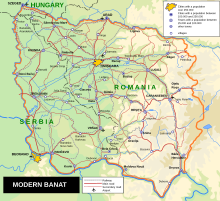Banat Swabian
| Banat Swabian | ||
|---|---|---|
|
Spoken in |
Banat , Batschka | |
| Linguistic classification |
||
Banat Swabian (also Donauschwäbisch ) is a dialect that was and is still partly spoken in the Danube Swabian settlement area in the southeastern part of Europe, the Banat and the Batschka . The dialect, characterized by the proportion of the High German sound shift as Middle German , is very close to the Palatinate and Saarland , peppered with elements from East Franconian and Hessian .
Emergence
Banat Swabian includes a number of dialects which, depending on the dialects of the various areas of origin of the German immigrants, were most prevalent in their development in the 18th century. The largest number of immigrant families in the middle of the 18th century came from Moselle-Franconian and Rhine-Franconian areas, as well as from South Franconian, East Franconian, Swabian, Alemannic but also from Westphalia. These founding families initially communicated in six dialects. One could conclude that the dialect spoken today should be predominantly Moselle-Franconian. But because there was a balance between the dialects, because the speakers tried to standardize their language habits, the dialect that most closely approximated the standard language and that was also understood in the neighboring towns prevailed over time.
distribution
This also applies to the dialect in Biled , because the dialect spoken there bears the typical characteristics of Rhine-Franconian and to a lesser extent those of Mosel-Franconian, although the Moselle-Franconian immigrants predominated in the settlement. This means that the Billeder dialect is a Rhine-Franconian-Moselle-Franconian mixed mouth in which the majority of the Rhine-Franconian characteristics have remained and the Palatinate ones have prevailed - this is why they are also called "Fescht dialect".
Proverbs and sayings
Billeder dialect - collected by Jakob Martini
- De is of de dog come.
- De broke his teeth.
- De has fauschededick behind the ears.
- Whenever you shake your hand, you have to count your fingers.
- De has no hands, de has greaseparts.
- De whistles out of the hole.
- Money as mixed, nor can it be in the table.
- When it comes to money, friendship warrants.
- That's a poor eater.
- Wherever you eat soup, you live long.
- De Richter and de Schinner, these like sister-in-law.
- Better to walk in a rustic way than to walk imperiously.
- Everything is dizzy, nor en milk is water.
- And there would still be scholars from heaven.
- Whenever de Esl is happy, there is often an ice dance.
- De has the cat in the bag.
literature
- Billed, a Swabian village in the Banater Heide
See also
- Banat Swabia
- Language of the Danube Swabians
- Schwabenzug
- Aegidius Haupt , Banat Swabian dialect poet
Web links
- www.kulturraum-banat.de , Hans Gehl: Rheinfränkisch in the dialects of the Danube Swabians
- www.kulturraum-banat.de , Hans Gehl: Moselle Franconian in the dialects of the Danube Swabians
- www.billed.de

